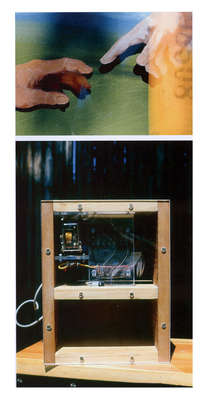”Departure, a moving apparatus that White produced in 1977, is a critical reflection and ironic comment on the role of the artist as a creator. This artwork is set in motion when the viewer throws coins into a slot. Two black curtains then open to reveal Adam’s arm from Michelangelo’s fresco of creation in the Sixtine Chapel, painted from 1508 to 1512; it is seen before a green background. A light at the right-hand side of the stage marks the moment when Adam’s arm is raised and the arm of God swings down from top to bottom. At this moment, a spark spings from God’s finger to that of Adam. Afterwards, a light appears on the left-hand side of the stage and the curtain closes again. Every visitor can set creation in motion for seven cents here, but the true ironic comment is not aimed at the biblical story of creation, but at the masterpiece by Michelangelo, whose artistic genius is so much associated with his portrayal of Adam’s creation. Besides Dürer’s citation of Christ in his Self-Portrait of 1500, Michelangelo’s fresco is the key work defining the artist as a creator by means of Christian iconography – as an artistic creator in general, as well as the creator of the specific, innovative, unusual and irreproducible masterpiece.
This interpretation and the nonnected view of the artist were prevalent from the Renaissance around 1500 until the age of Modernism, and it still has a specific expression in the image of heroic painters like Jackson Pollock, for example. The mechanics and usage of Departure – the ironic title of which degrades the moment of creation into the start of a journey, as if the divine spark was no more than a railway signal – are reminicent of a fairground automaton for the amusement of its audience. Michelangelo’s brilliat pictorial solutions, as well as his focus on the muscular, perfect human being as the indisputable centre of creation, turn into marionettes in a game that is operated by an electronic mechanism. The artist becomes a tinkerer and his work is revealed as a contemporary metaphor of his artistic creativity, showing it to be staged and in no way connected to the artist’s special genius. In a pointed way, Departure shows the degree of general scepticism towards the artist’s claims …“ (Herzogenrath & Lähnemann 2009:15f).


